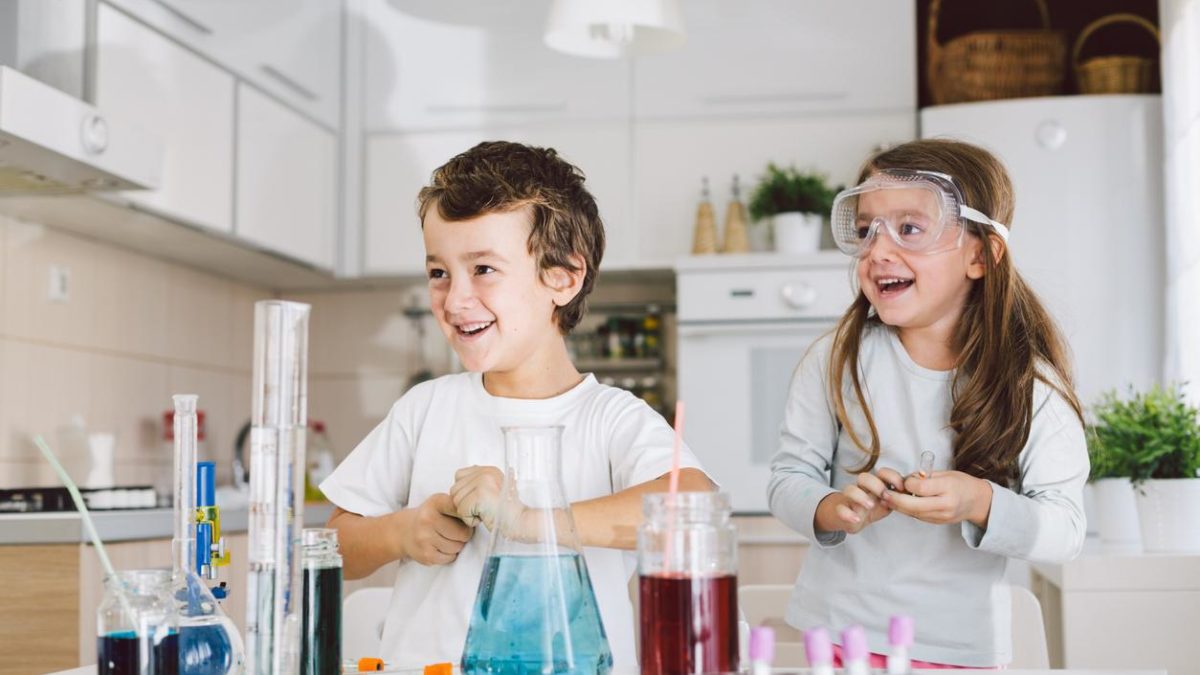Science is the study of all existing things and it helps us make sense of the world around us. Learning science is an extremely important part of a child’s education. But sometimes science lessons can seem too abstract and puzzling for children. They find it hard to understand and make sense of the lesson. This is why performing science experiments is so important.
There’s a certain WOW! factor in seeing a particular science concept come alive in experiments. This helps children relate to and understand the concept better. For example, the recent Covid-19 pandemic has brought to light the importance of washing our hands with soap regularly. Kids won’t understand the importance when you just explain it. But when you demonstrate it in the form of an experiment like the pepper and soap experiment, the kids understand the concept better. When they see the pepper flakes being repelled by soap, they’ll understand how washing regularly with soap gets rid of germs.
Additionally, it also improves their academic performance. So, whether you have a budding engineer, ecologist or biologist, support their science learning by performing science experiments for kids at home.
Here Are 5 Benefits Of Performing Science Experiments At Home
Performing science experiments at home with your kids has a lot of benefits. From clarifying their doubts to helping them understand the concept better and even improving their academic performance, experiments have a lot of benefits. Here are 5 reasons why you should perform science experiments for kids at home:
- Hands-on learning: Kids learn best when they’re involved in hands-on learning activities and games. Activities like performing science experiments at home, not only help them learn but also enhance their curiosity and interest in learning. This is because these hands-on activities engage their senses. It gives them a real experience that helps them discover things on their own.
- Thinking skills: Science experiments bring an abstract, theoretical science lesson to life. This gets the child thinking about why and how things work in certain ways. Additionally, it also improves their observation, logical thinking and deductive reasoning abilities. Kids will also start asking questions and discuss their observations, which leads to better learning. This also improves their prediction skills.
- Sparks their curiosity: Performing experiments leads to new discoveries, which sparks the child’s imagination and curiosity. It also helps them solve problems on their own, set goals and improve their resourcefulness. For example, performing an experiment like the lava lamp experiment is a magical experience. It’ll get the child wondering how the colored blobs keep moving in the liquid. Learning the science behind it will encourage the child to think about what other materials can show a similar reaction.
- Clarifying doubts: The theoretical aspect of science lessons can sometimes be boring and confusing. But a simple experiment performed at home can help the child clarify those doubts and understand the lesson better. For example, understanding the chemical reaction between acids and bases can sometimes be very difficult for children. But when you perform an experiment like a baking soda volcano, the children can see the chemical reaction in front of them. This will help them understand that when acids and bases are mixed together, they release a gas called carbon dioxide.
- Boosts scientific knowledge and confidence: Performing science experiments at home helps children understand how things work. It offers a direct sensory learning experience, which gives children in-depth knowledge of the subject. Creating masterpieces like colorful volcanoes or egg drop devices will give them a sense of accomplishment. So, along with boosting their scientific knowledge and thinking skills, science experiments fill them with confidence to face challenges. It helps them come up with creative new ideas to solve problems and learn from their mistakes. And most importantly, kids tend to remember things they learn from doing experiments or participating in hands-on activities. So, performing experiments at home enhances their learning and memory skills, which in turn boosts their academic performance too.
Yes, it does make a mess and makes more work for you. But the fun and learning they get from the activity is worth the extra work. So, the next time you have a free afternoon, gather your little ones in the backyard and blow their minds with some cool science experiments.
Related posts
Archives
- May 2024
- April 2024
- March 2024
- February 2024
- January 2024
- December 2023
- November 2023
- October 2023
- September 2023
- August 2023
- July 2023
- June 2023
- May 2023
- April 2023
- March 2023
- February 2023
- January 2023
- December 2022
- November 2022
- October 2022
- September 2022
- August 2022
- July 2022
- May 2022
- April 2022
- March 2022
- February 2022
- January 2022
- December 2021
- November 2021
- October 2021
- September 2021
- August 2021
- July 2021
- June 2021
- May 2021
- April 2021
- March 2021
- February 2021
- January 2021
- December 2020
- November 2020
- September 2020
- August 2020
- July 2020
- June 2020

